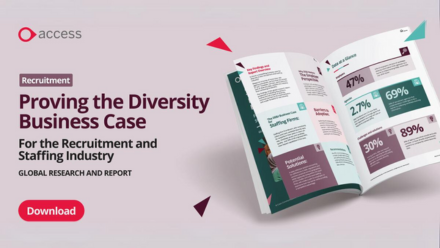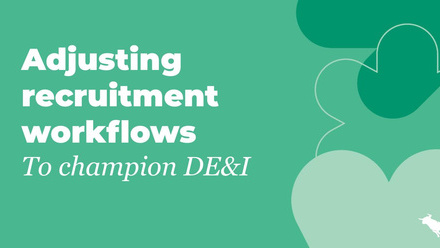Improving inclusivity for LGBTQ+ people in your recruitment business
An introduction to me:

My name is Lucy, I’m the CEO of Pod Talent, and I am openly gay and non-binary.
I started working in recruitment in 2007, and have had to come out 3 times in my career; at my first recruitment business when starting my career, on joining my second recruitment business in 2009 and in 2022 when I came out as non-binary (and did that not just internally, but publicly on LinkedIn too).
Each of these experiences was challenging for me in different ways. Hiding your identity is exhausting, fear of discrimination is horrible, and the idea of coming out internally, to clients and candidates in the recruitment industry especially is very scary. I’m lucky to have worked in inclusive businesses with great allyship, and I wouldn’t have had the career I’ve had in recruitment without that.
Why is LGBTQ+ inclusivity in recruitment important?
- Inclusivity covers multiple intersectionalities; things that promote LGBTQ+ inclusivity will improve inclusivity across your whole business.
- The 2022 Diversity & Inclusivity in the Workplace Survey by Wildgoose showed that 57% of employees had witnessed discrimination or a lack of inclusivity whilst at work and 14% have left their company, or know someone who has, due to discriminatory behaviour at work. We all know that staff retention is a key challenge in recruitment, so inclusive behaviours can directly help you!
- The most recent census of 2020 showed that 93.6% of people identify as heterosexual or straight - this percentage has been decreasing since 2014, so you are more likely to have people who are LGBTQ+ in your business than ever before.
- 16% of Gen-Zs identify as LGBTQ+ vs. 9% of millennials – if, like most recruitment businesses, you take on inexperienced hires every year, more of these people are likely to identify as LGBTQ+ than before
- Promoting inclusivity internally is a really positive step in educating your consultants on how to show inclusivity when working with clients and candidates – DE&I is an important topic for clients across all sectors, so this will help your consultants to help their customers further.
What actions can you take to promote LGBTQ+ inclusivity in your workplace?
According to the CIPD’s Inclusivity and Diversity at work survey report 2022, only 7% of employers had a specific DE&I budget in place. So I have aimed to make these suggestions as free to implement as possible.
- Use of pronouns – not everyone identifies as the pronouns they were assigned at birth or the ones they present as. Promoting pronoun usage on LinkedIn, in signatures, on staff lists, in meetings etc. is a good way to create a safe space for people to be open about their identity.
- Consider your incentives – not everywhere is safe for people who identify as LGBTQ+ (or indeed a number of other people) so if you’re planning an incentive try and make it as inclusive as possible for your entire workforce considering gender, race, sexuality etc. I have heard of recruitment businesses that have incentive trips to Dubai, for example, where being LGBTQ+ is illegal.
- Have a zero-tolerance policy on homophobia/transphobia in your business (and all forms of hate speech) – openly publish this policy and make sure everyone has had training on it and knows where they can raise any issues confidentially as well.
- Be aware of microaggressions – homophobic/transphobic microaggressions come in many ways but eradicating these is important to inclusion (not just for LGBTQ+ people!). Microaggressions are often more hidden than outright hate speech. Some examples of microaggression in language about LGBTQ+ people include:
- Asking questions like “When did you turn gay?”
- Asking things such as “Which one of you is the man in your relationship?”
- Statements such as “Now I know you’re gay, do I have to worry about you fancying me?”
- Sentences starting “I’m not homophobic but…”
- Indirect insults such as “that’s so gay”
- Self-educate – some LGBTQ+ people are happy to answer questions about themselves. However, it shouldn’t be the responsibility of LGBTQ+ people to answer all of your questions, so do your own research first. If you want to know what “non-binary” means, for example, it’s easy to research this to give yourself a base-level understanding, before asking questions, to show allyship.
- Be mindful of intrusive questioning – all of my LGBTQ+ friends, especially those who are transgender, have said they have been subjected to intrusive/over personal questioning from people about their identity. If someone in your business tells you they are trans, you can ask things such as “what pronouns would you like me to use for you?”, “would you like me to refer to you by a different name moving forwards?” and most importantly of all “how can I support you as your employer?”
- Educate yourself on why LGBTQ+ inclusion is important – once you dig a bit deeper, the statistics about living as an LGBTQ+ person even in the UK are shocking. Here are some examples from Stonewall’s website:
- More than a third of LGBTQ+ staff (35%) have hidden that they are LGBTQ+ at work for fear of discrimination.
- Almost one in five LGBTQ+ staff (18%) have been the target of negative comments or conduct from work colleagues because they’re LGBTQ+.
- Almost one in five LGBTQ+ people (18%) who were looking for work said they were discriminated against because of their identity while trying to get a job.
- Read more at https://www.stonewall.org.uk/cy/lgbtq-facts-and-figures
- Educate your staff on what life is like for LGBTQ+ people to promote allyship – at Pod, as an example, we recently did a company-wide quiz for LGBTQ+ history month, covering statistics like the above, key dates in LGBTQ+ history, global LGBTQ+ history and popular culture – and we are also replacing our monthly book club with a podcast club which covers the Stonewall Riot – these are some examples of ways you can highlight LGBTQ+ challenges to your business and why your inclusivity matters.
- Don’t rainbow wash without action – whilst changing your logo to a pride flag in June may indicate some level of allyship, changing your logo for a month with zero other efforts around inclusion, is simply a waste of time and potentially more damaging to your LGBTQ+ colleagues. Use months relating to LGBTQ+ history to promote understanding and allyship in your business.
- Create active allyship – being a silent ally unfortunately isn’t very useful, you need to be active in your allyship. If you are heterosexual/cis-gendered you have a powerful role to play in promoting LGBTQ+ inclusivity, for example:
- Calling out/reporting homophobic comments in the workplace
- Taking the lead on LGBTQ+ related events and not asking for all inclusivity events to be led by minorities
- Using your pronouns to create a safe space for others to do the same
- Practising using people’s chosen pronouns and correcting use of wrong pronouns by others
- Joining workforce groups designed to promote inclusivity for minority groups – allies can join these groups too - in fact, it’s really helpful and encourages others to become allies too
- Create ERGs in your business – Employee Resource Groups can be used across your business for a number of topics, including marketing, wellness etc, but also DE&I ERGs are a great idea to create awareness and education across your business, and to boost inclusivity. Activities for these groups can include awareness-raising events, fundraisers, charity activity, reviewing internal processes and much more – and they are good for staff retention too as they provide people with wider learning opportunities!
- Talk about what you are doing externally – use your voice on social media to highlight the things you are doing to promote inclusivity and include these in your documents that overview your business to clients, candidates, and future employees. This will also help you to attract staff to your business.
If you have a budget to spend on DE&I, you could also:
- Invest in DE&I training for your workforce, this not only promotes inclusivity but gives your team the skills and resources to approach DE&I conversations externally with clients and candidates, improving their skillset as a recruiter
- Have a company event with a guest speaker who can discuss a DE&I topic with your team
We hope the above is useful on your journey towards creating LGBTQ+ inclusivity within your business and whilst a lot of changes can feel daunting, just making one change is a step in the right direction.
If you’d like an external resource group for LGBTQ+ colleagues within your business, you can also point them towards Campaign LGBTQ+ - a peer-to-peer networking group for LGBTQ+ recruiters and those who work in recruitment businesses, run by myself and other recruitment business leaders. Campaign events are free for people to come to and you can find out more and register here: https://www.wecampaign.co/ - please feel free to share this link with your business.


